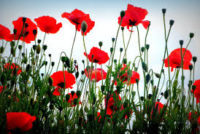In Flanders Fields the poppies grow… Remembrance Day is a significant day in the lives of many who endured the challenges of living during war times. As benefactors of their sacrifice, we sometimes forget that peace is a gift and the high price that was paid for it. Today we have young soldiers who are returning from war, many of whom are returning with a disability. Today I have the pleasure of working with a WW2Vet who hopefully will be well enough to participate in the services within his retirement community.
Veterans Independence Program
The Veterans Independence Program (VIP), developed in 1981, is a National Program that assists veterans to remain independent in their own homes. The primary caregivers (including a spouse, common-law partner, adult child or another individual) who were taking care of the veteran at the time of their death or admission to long-term care can also qualify to receive these benefits
Eligible survivors may receive housekeeping and/or grounds maintenance benefits. Services may include: vacuuming; laundry; making and changing beds; cleaning floors; dusting and general picking up; kitchen and bathroom cleaning; meal preparation; appliance cleaning; washing and changing windows; and errand services to purchase food, do banking, pay bills. Grounds maintenance services may include: snow removal to allow safe access to the principal residence; snow and ice removal from roofs when such conditions pose a threat to safety and access; periodical cleaning of leaves and debris from eavestroughs; tilling ground to enable the client to plant a small flower or vegetable garden; and lawn mowing and raking. Ability to access the services is dependent on health needs and whether these services are available to the veteran through some other governmental program and is means tested.
Lest We Forget…..
“Tips for Keeping Your Brain Young:
Get enough sleep. Older adults don’t need less sleep than younger adults.
Getting less than 7 or 8 hours of sleep at night can make it harder to concentrate and remember.
Get rid of stress Over time, stress can make it hard to get a good night’s rest. Stress can also make it harder to concentrate, learn and remember.
Exercise, prayer and meditation are good stress relievers.
Think, think, think The more you use your brain, the better it’ll work. Read.
Do that crossword puzzle. Play bridge. Join a discussion group at a senior center or church. Take a class at your local community college. Learn to play the piano or speak another language.
Socialize Spending time with other people also seems to give your brain a boost. Find ways to meet and get to know others. Join a club.
Volunteer. Try a part-time job.
Eat right A diet that is low in saturated fat (the kind found in fried foods, butter, cheese, beef and pork) but rich in fruits and vegetables and B vitamins is good for your brain. Your diet should also include a couple of servings of fish, especially salmon, tuna, sardines, and mackerel, each week. These fish are high in omega-3 fatty acids,
which are good fats that your brain needs. Ask your doctor or nurse if you should also take multiple vitamin daily.”
Source: Foundation for Health in Aging
Established by the American Geriatrics Society


0 Comments